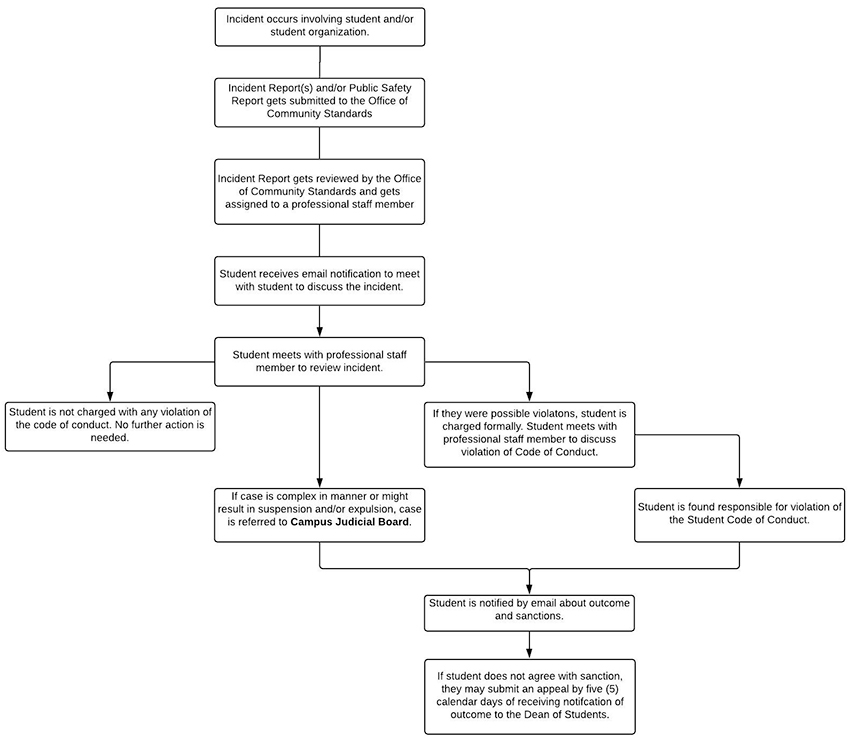The student conduct process, which exists in order to maintain the safe and efficient operations of Illinois Tech and to aid in advancing its academic mission, is based on the assumption that disciplinary procedures, when required, should aim to be an educational process, while also maintaining the safe and efficient operations of the university and protecting its community. The focus is on individual growth and development, personal responsibility and fostering respect for the community and its members. Sanctions are given and evaluated in relation to their effectiveness in achieving these outcomes.
*Please note, this chart highlights the conduct process in general and each situation is different and sometimes requires different responses.
Types of Hearings
- Administrative Hearings: A one-on-one meeting between the student and hearing administrator designated by the Dean of Students to discuss the alleged violation(s). The student may present witnesses and/or witness statement(s) on his/her behalf. Witnesses are defined as individuals who were at the incident in question and/or have information pertinent to the incident in question. The administrator may, in his or her sole discretion, disallow witnesses whose testimony would be redundant or not germane to the charges. The administrator determines responsibility and imposes any applicable sanction(s). Administrative hearings are typically used for cases that are deemed less serious in nature.
- Campus Judicial Board Hearings: The accused student and complainant (if applicable) appear before the Campus Judicial Board to discuss the alleged violations. The Campus Judicial Board determines responsibility and imposes any applicable sanction(s). A Campus Judicial Board will generally include two faculty members, at least one of whom is not in the student’s major department, two students, one Illinois Tech staff members, and either one Illinois Tech staff member from the Office of Student Affairs, or a designee appointed by the Vice Provost for Student Affairs, who will serve as chairperson of the Board and preside over the hearing but do so as a non-voting member, though they will be present during deliberations. Campus Judicial Board hearings will be used for cases where the alleged violation(s) could result in sanctions of suspension or expulsion or the allegations are deemed complex in nature.
Notification
All correspondence about possible violations of the Student Code of Conduct will be sent to the student's registered Illinois Tech email address. As stated in the Student Handbook "In person delivery or email correspondence sent to the student's registered iit.edu e-mail address will be considered sufficient written notification in all instances where written notification is required under this Code of Conduct or Student Handbook."
If you do not receive an email please check your email's Spam/Promotions folders and then update you email settings so we're on your safe send list. If you have questions about emails you have received from the Office of Community Standards, please email us at conduct@illinoistech.edu.
Appeal Process
An appeal of a sanction for violation of the Code of Conduct must be submitted in writing to the Office of Student Affairs (dos@illinoistech.edu) within five calendar days of notification of the decision. Supporting information must be submitted with the appeal. An appeal or submission made after this deadline will not be considered, and the student will be deemed to have waived his right thereto. Issues not raised in a timely submitted appeal will also be deemed to have been waived. In both cases, this means that any decision(s) and sanction(s), as the case may be, shall be final.
An appeal to the Provost/Dean of Students may be made only for one of the following reasons:
- The procedures outlined above were not substantially followed and such occurrence reasonably could be deemed to have impacted the outcome;
- The sanction imposed was inappropriate for the offense; and
- New evidence that was not available at the time of the original decision, due to no fault or lack of diligence of the student, has become available.


